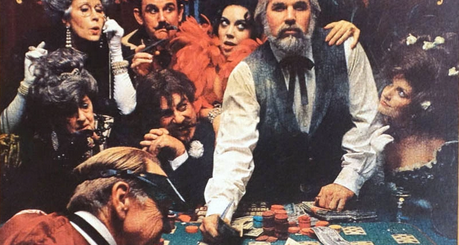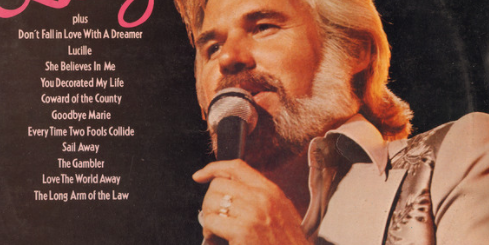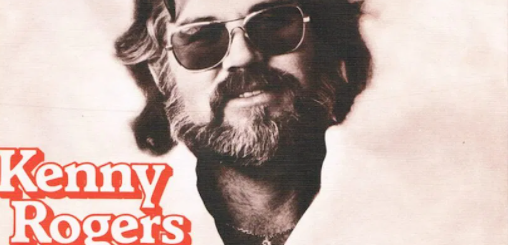Kenny Rogers’ “Coward of the County” Lyrics Meaning
This is another one of Kenny Rogers’ classic songs, like “The Gambler” (1978), which not only features a movie-like story line but also contains an implied life lesson. It is centered on a character named “Tommy” who as a child is referred to as “Yellow”, i.e. a coward, due to his pacifist ways. In fact his father, who is deceased, makes him promise to “turn the other cheek”, as in not respond violently when physically challenged, as opposed to getting into fights.
Moreover his late father told him that fighting is not what defines his manhood. And he is seemingly giving him this advice to prevent Tommy from replicating the same kind of mistakes that landed him prison, where he ultimately passed away while the boy was just 10-years old.
The Narrator (Kenny Rogers) is Tommy’s Uncle
Furthermore, it should be noted that Kenny Rogers, the narrator, is relaying this tale from the perspective of Tommy’s uncle, i.e. his father’s brother.
Eventually Tommy, upon getting older, falls in love with a lady named “Becky”, who likewise loves him, as she isn’t the type to be impressed by acts of machismo. Then the story takes a twist when some dudes referred to as “the Gatlin boys” decide to, succinctly put, gang assault Becky. This totally pisses Tommy off, and the first thing he does in response is, in his heart, forsake the aforementioned promise he made to his dad.
Tommy confronts the Gatlin Boys
So Tommy goes to confront the Gatlin boys, who are three in number, presumably in some type of public venue like a bar. And the confrontation concludes with him leaving “not a Gatlin boy… standing”. Now due to the lack of details, it is not clear how exactly he dealt with the crew. But the bottom line is in some way, shape or form he really beat them up mercilessly.
But immediately after doing so Tommy realizes that he has consciously broken the pledge he made to his dad. And in fact throughout the whole situation he relates to his father as if he’s still alive. Thus he apologizes to him but rationalizes his actions by stating, in direct contrast to what his dad told him, that “sometimes you gotta fight when you’re a man”. And that statement can be considered the moral lesson, if you will, of this song.
And the track ultimately concludes with everyone in the ‘hood realizing that Tommy isn’t “the coward of the county” as they presumed.

Facts about “Coward of the County”
The song was released on 12 November 1979 as the second (and last) single from Kenny Rogers’ well-received album, “Kenny”.
This track was issued by United Artists Records and produced by Larry Butler.
“Coward of the County” topped the UK Singles Chart, Billboard’s Hot Country Songs, Canada Top Singles and the Irish Singles Chart. It also charted in a handful of other countries, including South Africa and Switzerland.
It should also be noted that “Coward of the County” scored a number 3 on the Billboard Hot 100 itself, in addition to topping the formerly-prominent US Cash Box chart. This is significant because back in those days it was rare for a country-music song to become popular with mainstream audiences. However, Kenny Rogers was a master of churning out such hits.
In fact this track proved to be so popular that it led to the creation of a “Coward of the County” television movie, which featured Kenny Rogers himself as Tommy’s uncle. And the same thing actually happened with a single Rogers released a year prior, “The Gambler”.
It has been speculated that “the Gatlin boys” mentioned in the song is actually a reference to one Larry Gatlin – a country musician in his own right – and his two brothers, whom he occasionally performed with. Moreover it just so happens that Larry had a girlfriend named Becky. Kenny Rogers himself did not realize this similarity upon recording the song. And one of the co-writers, Billy Edd Wheeler, flat-out denied that such a connection was intentional. However, Larry Gatlin went on to point out that the other writer, Roger Bowling, did in fact have some type of personal beef with him. Moreover he stated that he and his brothers “started getting accused of being rapists” due to “the Gatlin boys” namedrop in “Coward of the County”.









Is this based on a true story? We in Jamaica just want to know.
No!
I’m still confused by the last line. The last line is, “They considered him the coward of the county”. To me that meant that they still thought he was a coward. I don’t see how the last line suggests that they (the residents) changed their mind about that.
Yes and no. It is a matter of perspective.
The first one is ironic, in the sense that since everyone considered him the coward of the county, it is ironic that he went and beat them up. A coward would not have taken that fight. So the last line in this perspective is a call-back at him having been “a coward” all his life – maybe due to he had never fought… “Twenty years of crawling was bottled up inside him”.
The second one aligns with your perspective. Maybe by fighting he became a coward for many reasons: 1. He failed to follow his father’s word of advice (thus a coward in some sense); 2. Despite beating them up, he was still a coward (one action does not overturn a lifetime of decisions – once a coward always a coward?); 3. Saying that the beating “was for Becky” instead of just fighting for his honor (this one may not be very logical but it stems out from the idea that he used Becky as an excuse to beat them up instead of standing up for himself after all those years of mockery).
There might be many other perspectives, but these are just a few I thought. The real meaning we will never know, unless the writers stipulated otherwise.
I really like your contribution towards this discussion .
I’ve always read into it a bit more, just to feel better about the line. Everyone still considered him a coward, is a gesture of respect and protection. He proved his courage, but people knew if the law learned the truth, he’d go to prison, so they kept up the story that he was a coward and stayed quiet about what happened to the Gatlin boys. But in their hearts he’s a hero.
The whole story is ironic
In my head I hear it as “And to think, they considered him the coward of the county…” This makes sense to me because nobody in the town would have known that his father told him to turn the other cheek. They just would have considered him a coward because it was a standard thing to stand up and fight for what you needed/wanted/deserved or to defend yourself. Nobody knows that he broke his promise to his father either. They just know that he did something a coward would never do.
If that indeed was the last line as you wrote, ‘considered’ is past tense so implies they used to but not anymore.
I have always wondered if Gatlin Boys was an indirect reference to the Gatlin Brothers, sort of tongue-in-cheek type of thing. Any comments?
Read the article?
good read, good song
The last line is confusing: “Everyone considered him the coward of the county.” That seemed to conflict with Tommy defending Becky’s honor. So after reading the post above and its comments, I concluded that the last line really means “Everyone now considered him brave.” I do this because knowing Kenny Rogers from his past lyrics, he’s a man’s man. Also, defending his girlfriend’s honor the way he did was admirable.
It’s called IRONY. Geesh. It’s like Ebert not understanding the scene The Elephant Man opens with
that depicts a woman being “struck down” (raped?) by a “wild elephant” when that is the STORY
that the cruel circus keeper tells the audience to explain the deformed man, rationalizing that
“The result… Is plain to see.” – The movie is showing the story the “owner” tells to the crowd.
It makes it even sadder, just like the last line in the song makes it sad. Irony.
Nice explanation